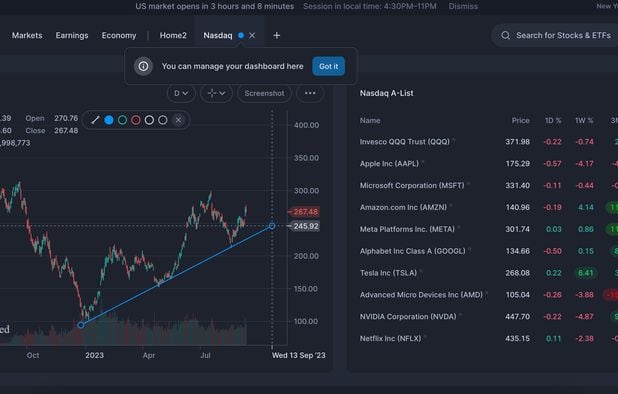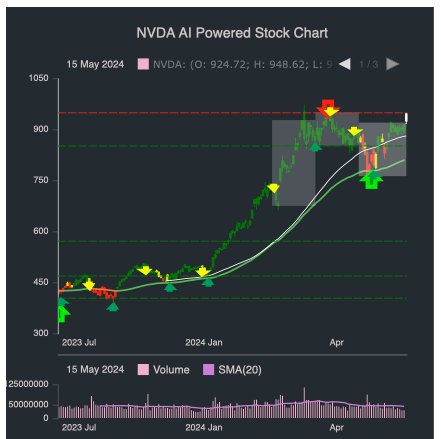In order to obtain the most value for your money for your money, you should evaluate and price AI analysis and stock prediction platforms. Understanding what you are paying for and the price structure may be quite different. This will help you make an informed choice. Here are the top 10 tips for assessing the price and cost of these platforms:
1. Find out more about the pricing model
Subscription-based: Determine whether the platform charges an annual or monthly cost, and also what features are included on each level.
Pay-per-use: Check that the charges for the platform are based on usage, such as number of trades (or data requests), or prediction.
Freemium model: Check whether it provides a free level with limitations in functionality, and charges for premium functions.
2. Compare Pricing Tiers
Compare features across each pricing level (e.g. professional, basic).
Scalability: Ensure the pricing levels align with your needs, regardless of whether you're an individual trader or professional.
Upgrade flexibility: Discover whether you can effortlessly upgrade or downgrade when your requirements alter.
3. Evaluate Hidden Costs
Data fees: Find out if you need to pay additional for accessing premium data.
Brokerage Fees: Determine the extent to which your platform charges fees for integration or trade execution.
API usage: Assess if there are extra costs for API access or frequent API usage.
4. Demos and Free Trials, and Test Drives
Trial period: Select platforms that let you test out the features of their platform prior to making a commitment.
Trial limitations: Find out whether you can utilize all the features of the trial or just one or a few.
Choice of no-commitment: Be sure you can cancel your trial at any time if it doesn't suit your needs.
5. Look for promotions and discounts.
Annual discounts: Find out whether the platform offers discounts for annual subscriptions compared to monthly plans.
Referral programs. Make sure the platform gives discounts or credits to refer users.
Contact us for bulk or institutional prices if your business is large.
6. Calculate Return on Investment
Cost and value: Compare the cost of a platform against its capabilities. Can it save you time or assist you in making better trading choices?
Study the platform's track record or user testimonials to determine the potential return on investment.
Costs of other platforms: Compare the cost of the platform with the potential cost of not using it (e.g. missing opportunities, manual analyses time).
Review Refund and Cancellation Policies
You should be able to cancel your subscription at any time without being charged any penalties or fees.
Refund policy: Check whether the website offers refunds on unused portions of your subscription.
Auto-renewal. Find out if the platform automatically renews your account. If it does, you'll need to know how to stop it.
8. Price transparency is essential.
A clear price page Make sure that the platform has a detailed and precise pricing page that is free of hidden charges.
Customer Support If you have any questions about prices and charges, call customer support.
Contract Terms: Read the conditions of service for any penalties or long-term agreements.
9. Compare with Competitors
Comparing features: Ensure you are getting the best value and the best platform when comparing it against its competitors.
User reviews: Read user feedback to see whether other users think the platform is worth the cost.
Market positioning: Find out the price of the product, whether it's a high-end, mid-range, or low-cost alternative and whether it's in line with what you expect.
10. Review the long-term costs
Price increases Review the history of the platform to determine how often it has increased prices.
Additional features to your plan Consider if you require an upgrade or if the latest features are available in your plan.
Cost for scaling The platform needs to be priced appropriately when your trading activities or data requirements increase.
Bonus Tips
Try out different platforms. You can test multiple platforms for free, and then compare them.
Negotiate prices: If you have many customers or are part of an organization, you can ask for discount and pricing that is custom to your needs.
You can find educational free sources on certain platforms.
These tips will assist you in evaluating the prices and costs of AI stock-Predicting/Analyzing trading platforms. You can pick one that is suitable for your budget, while providing the features you require. A platform priced right should strike a equilibrium between affordability, functional and performance in order to optimize the value of your trading. Follow the top AI stock trading bot free for blog tips including chart ai trading assistant, stock ai, ai chart analysis, ai for investing, ai investing app, trading ai, AI stock picker, ai trading, ai for trading, chatgpt copyright and more.

Top 10 Suggestions For Evaluating The Quality And Reliability Of Stock Trading Platforms Based On Ai
Analyzing the scalability of AI-driven trading and stock prediction platforms is crucial for ensuring they can handle increasing volume of data, demands from users and market complexity. Here are top 10 tips on how to assess scalability.
1. Evaluate Data Handling Capacity
Tip: Verify that the platform you are using is able to process and analyze large data sets.
Why: Scalable systems must manage data volumes that are increasing with no performance loss.
2. Test real-time processing capabilities
Find out how your platform is able to handle live streams of data in real-time such as live stock quotes, or breaking news.
Reason: Delays in trading decisions can result in missed opportunities.
3. Check Cloud Infrastructure for Elasticity
Tip - Determine if a platform is using cloud infrastructure, e.g. AWS or Google Cloud.
Why? Cloud platforms are elastic, and they can be scaled up and down in response to the requirements.
4. Algorithm Efficiency
Tip: Assess the efficacy of AI models utilized to make predictions (e.g. Deep Learning and Reinforcement Learning).
Why: Complex algoriths can be resource intensive So the ability to optimize these algorithms is essential to scalability.
5. Learn about Parallel Processing and Distributed Computer Systems.
Tip: Check if the platform supports distributed computing or parallel processing frameworks (e.g., Apache Spark, Hadoop).
What's the reason? These technologies offer faster data analysis and processing across multiple nodes.
Examine API Integration and Interoperability
TIP : Make sure your platform integrates with other APIs, like brokers and market data providers. APIs.
The reason: seamless platform integration makes sure it is able to adapt to new data sources or trading environments.
7. Analyze User Load Handling
You can simulate user traffic and see how the platform reacts.
The reason: Scalable platforms must deliver the same quality of service regardless of the number of users.
8. Examine the Retraining Model and its Adaptability
Tips: Examine how often and effectively AI models are trained with new data.
Why? Models have to constantly adapt to the changing market to ensure that they remain precise.
9. Check Fault Tolerance (Fault Tolerance) and Redundancy
Tips: Ensure that your platform has failover mechanisms that can handle software or hardware failures.
Why is that downtime in trading can be expensive, and fault tolerence is important to ensure the scalability.
10. Monitor Cost Efficiency
Tips: Examine the costs of scaling the platform, including cloud resources, data storage and computational power.
The reason is that it should be at a cost that is viable. This means that you must balance efficiency against cost.
Bonus Tip Future-Proofing
Ensure the platform is built to take advantage of new technologies (e.g., quantum computing and advanced NLP) and to adapt to regulatory changes.
It is possible to assess the efficacy and scalability of AI trading and stock prediction systems by focusing on this particular aspect. This will ensure that they're efficient, robust and prepared for growth. Check out the top rated from this source for ai copyright signals for more examples including AI stock price prediction, how to use ai for copyright trading, free AI stock picker, best AI stocks to buy now, investing with ai, can ai predict stock market, best AI stocks, best AI stocks to buy now, ai options, best AI stocks and more.
